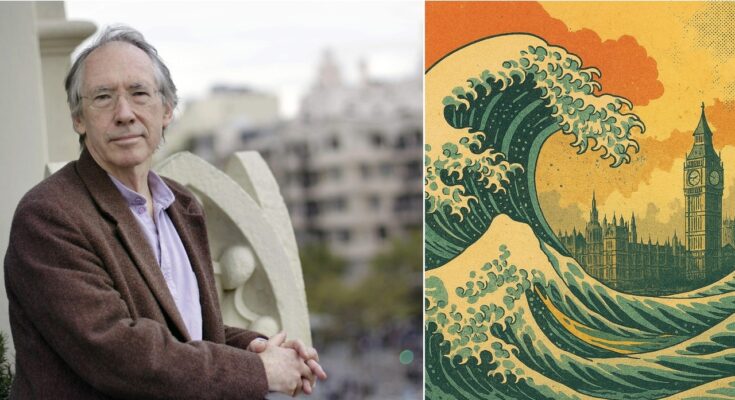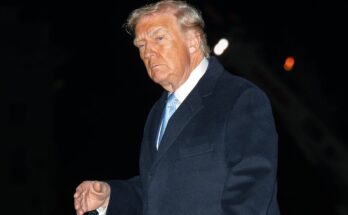“Mine is science fiction without the science. It’s pure speculation about the future of humanity, our history, love and betrayal. It’s also a rather personal book.” Ian McEwan talks about his latest novel, What We Can Know (Einaudi). The Booker Prize-winning British writer and author of such masterpieces as Children in Time and Machines Like Me, imagines a literary scholar in the year 2119, Thomas Metcalfe, who, in a world now submerged and tested by the Great Cataclysm, is obsessed with a lost legendary poem by a great poet of the past – that is, of our time – that seems to predict cataclysms about global warming and impending conflict. A kind of Holy Grail poetry. But the reality, as is often the case, is different from what it seems. «Even though people always ask me about nuclear war – says McEwan – the narrative focuses on love affairs, marriage and even crime. And the most authentic voice in the book is a flawed character, in the second half of the novel, the poet’s wife takes control of the narrative and tells us what we could really know. That is not true.”
He envisioned that within a century, England would be an island nation with his native Oxford encased in a new land called Snowdonia, and the nation of Nigeria a nation of global importance. How is this possible?
“In the next 20 years, Nigeria will be one of the most populous countries in the world. Meanwhile America in my opinion is heading towards decline, with energy ambitions along the lines of the 19th century with oil, gas and coal. Meanwhile, China is exporting solar panels all over the world. So, yes, I can imagine Nigeria as a new local power. It’s not impossible. But mine is not a prediction. It’s just speculation.”
Insularity is also an important theme in his book. Is this a metaphor for the way we live without thinking about what happens to other people?
“We seem to have shifted our attention away from, for example, climate change. Big companies that 15 years ago were eager to appear at least somewhat concerned about the climate have abandoned funding for green energy projects. It’s as if we feel like we’re entering a dark place, and we can’t do anything to stop it.”
Is the poem that Thomas Metcalfe sought to become legendary precisely because no one has been able to read it?
“There are many writers who end up like this, like Stevenson. Everyone mentions Treasure Island without ever reading the book. In the Anglo-Saxon world, I think the most striking case is Stephen Hawking’s A Brief History of Time. It sold millions and millions of copies, but no one read it. Because no one could understand it. Like all books about quantum mechanics, you put it on page six. But you know, in England people also constantly quote Shakespeare without realizing it. We have a lot of clichés, like “fading into thin air,” “the milk of human kindness.” These are all Shakespeare quotes. So it’s interesting how literature can penetrate culture subconsciously.”
There are also opposite cases.
“There is also a big phenomenon. My wife told me about Rosalía, a young Spanish woman, whose songs are on Spotify and have 24 million listeners. She speaks many languages, she combines Vivaldi and rock and roll, she is doing something very interesting. I talk about her with a little envy, thinking how wonderful it would be to be 19 years old, doing something equally new and of high quality, and at the same time reaching so many people.”
Another big theme in his book is artificial intelligence. Is it possible to decide that nuclear war is so dangerous, as you write?
“Yes, yes. If there is a missile coming towards you, you have 15 minutes to react. You have to refer to the president, the prime minister who has to talk to the generals and then decide what to do. Someone will be tempted to use artificial intelligence to make decisions in seconds. Or do we want to leave that task to Trump?”.
Its protagonist defines the invasion of Ukraine in 2022 as the beginning of the Great Cataclysm. Do you also believe in that?
“The risk is there. We don’t know what will happen. Sooner or later Ukraine will have new weapons, but the situation is still in danger. And if things get worse, I think Moldova will be the next country to be attacked, and then the Baltic countries.”
What do you think about the recent BBC video case about Trump?
“Of course the program made mistakes, and I think the editor and the director should probably resign, but the head of the BBC in the UK should not resign. I think the populist right wing don’t like the BBC department called Verify, where they look for two or three sources to verify every story.”
You often, in your books, try to show the past in new ways.
“There are many things in this era that remind me of the 1930s, when we saw nationalism, military ambition and the dissolution of the old Treaty of Westphalia. Now we have the United States dealing with the disasters of Venezuela, Ukraine and Russia. The old world order is starting to disappear, there is a lot of racism and xenophobia going on and I fear Europe will face the same mistakes it made in the second half of the 1930s.”
What do you think about Brexit?
“It was a huge mistake. Every worst prediction came true. Our economy contracted by 4%, and we have created a new problem, never seen before, with the crossing of illegal immigrants across the English Channel.”
© ALL RIGHTS RESERVED



